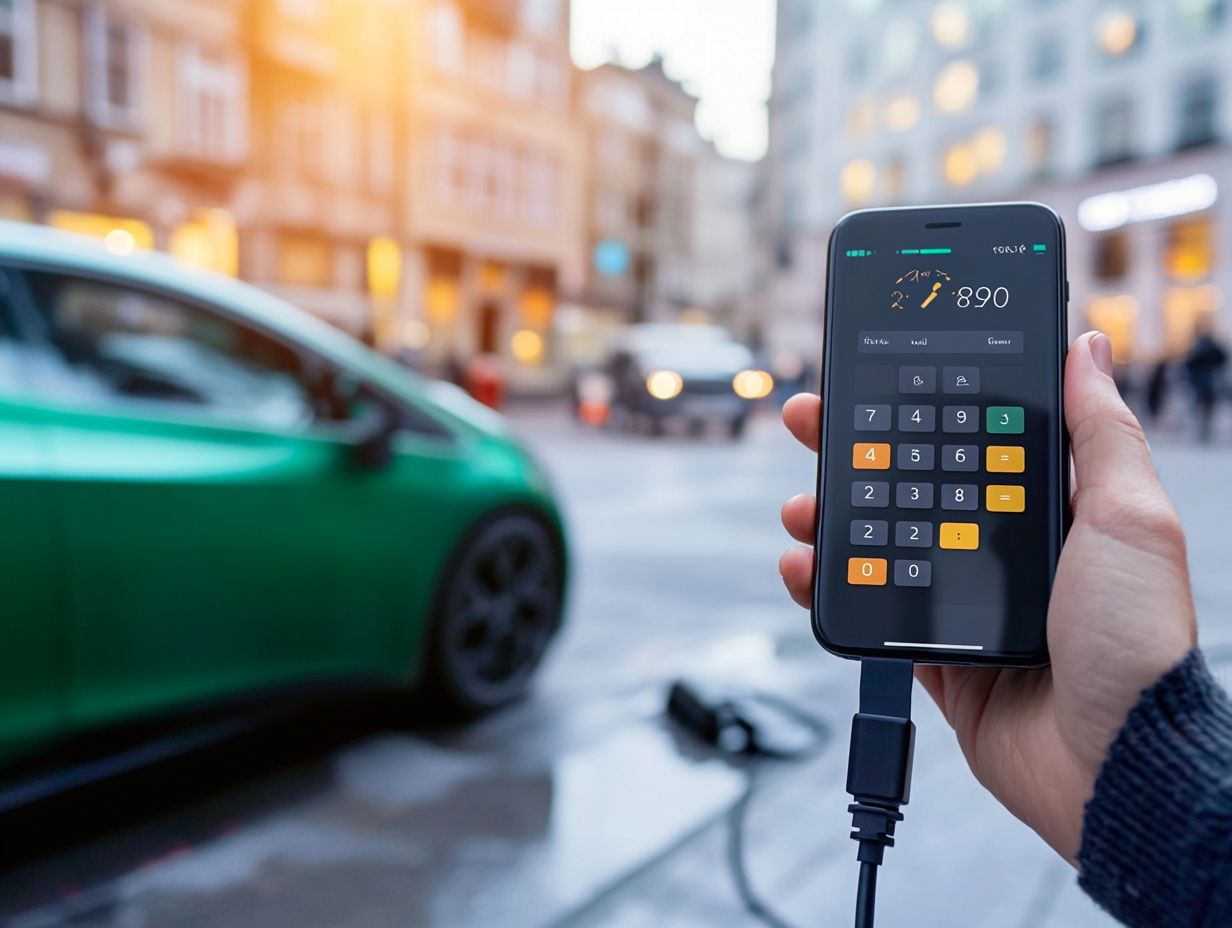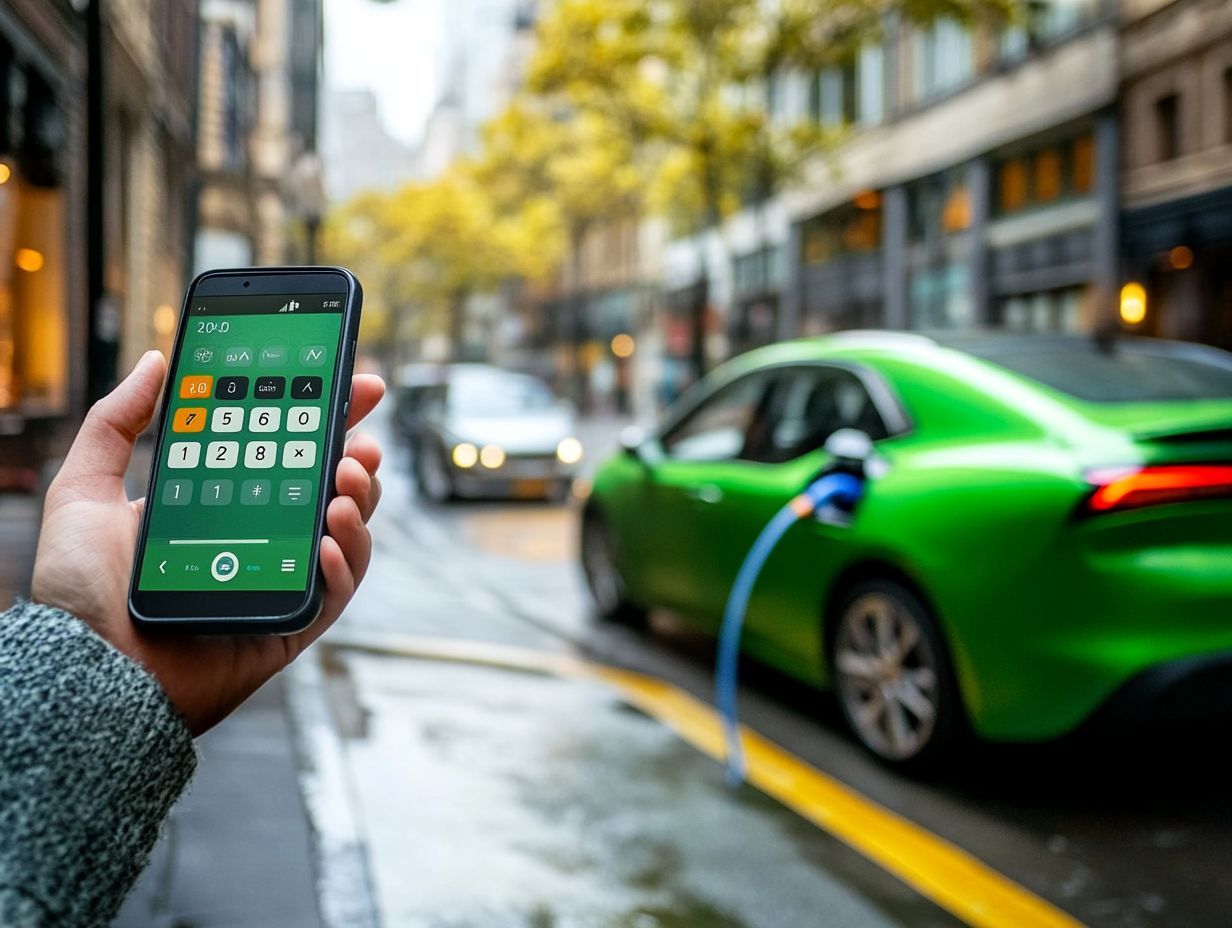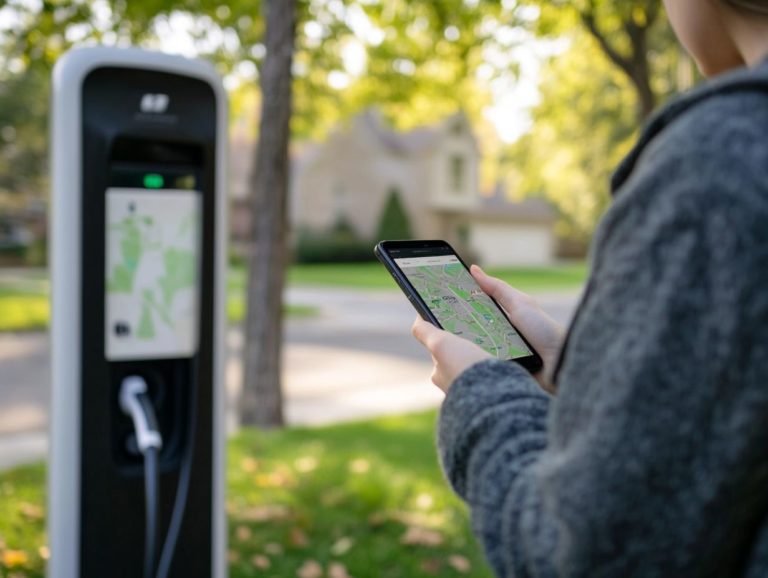electric vehicle rebates: what to expect
As electric vehicles (EVs) reshape the automotive landscape, grasping the available rebates and incentives can enhance their appeal for you.
This overview provides essential details on electric vehicle rebates, covering various types and eligibility criteria. It also offers a straightforward guide on how to apply, delves into the financial and environmental benefits these incentives provide, dispels common myths, and examines the future of EV rebates. This ensures you re thoroughly informed and ready to seize these opportunities.
Contents
- Key Takeaways:
- Overview of Electric Vehicle Rebates
- Available Rebates and Incentives
- How to Apply for Electric Vehicle Rebates
- Benefits of Electric Vehicle Rebates
- Common Misconceptions about Electric Vehicle Rebates
- Future of Electric Vehicle Rebates
- Frequently Asked Questions
- What is an electric vehicle rebate?
- Who is eligible for electric vehicle rebates?
- How much can I expect to receive in electric vehicle rebates?
- Are there any restrictions on the use of electric vehicle rebates?
- What is the application process for electric vehicle rebates?
- How long does it take to receive the electric vehicle rebate?
Key Takeaways:

Electric vehicle rebates help you save money and support eco-friendly choices.
Types of rebates include tax credits, cash rebates, and discounts on charging equipment. Eligibility criteria vary by state and program.
Applying for electric vehicle rebates involves a simple step-by-step process and can lead to significant savings while positively impacting the environment.
Overview of Electric Vehicle Rebates
Electric vehicle rebates offer a remarkable opportunity if you’re considering the purchase of a new or used electric vehicle. These incentives, including what you need to know about EV purchase rebates, are aimed at encouraging the adoption of clean vehicles.
By understanding IRS rules, you can maximize your savings. These rebates can significantly lower your tax burden and broaden your eligibility for electric vehicles, whether you’re eyeing plug-in hybrids or fully electric models like the Ford Mustang Mach-E and General Motors Hummer EV.
Explanation of Rebates and Incentives
Rebates and incentives for electric vehicles are designed to significantly lower your overall cost of ownership, making these eco-friendly options even more appealing. By promoting environmentally responsible transportation, these programs aim to benefit both you and the planet.
These programs can vary considerably based on your state and locality, often influenced by specific criteria such as income levels or the type of vehicle you choose.
You could receive federal tax credits that offer up to $7,500 for qualifying electric vehicles, effectively reducing your tax liability. Certain states may also provide their own rebates, further enhancing your savings.
Take California, for example; it provides a rebate of up to $2,500 for eligible battery-electric vehicles. To maximize these benefits, understanding the process for EV rebates is crucial. Ultimately, these financial incentives not only reduce your initial purchase price but also encourage broader adoption of clean technologies, contributing significantly to reducing carbon footprints across the nation.
Available Rebates and Incentives
A variety of rebates and incentives for electric vehicles can substantially lower your purchase or leasing costs, making these eco-friendly options much more attainable.
From federal tax credits to state-specific rebates, these financial incentives differ by region and are thoughtfully crafted to promote the acquisition of new electric and plug-in hybrid vehicles.
Types of Rebates Offered
The types of rebates available for electric vehicles include federal tax credits, state-level rebates, and local purchasing incentives, all designed to encourage the adoption of electric transportation.
Each of these financial benefits plays a crucial role in lowering the upfront costs associated with owning an EV. Federal tax credits can significantly reduce your tax liabilities when you purchase eligible models, offering substantial savings during tax season.
State-level rebates can vary greatly in amount and eligibility. They not only enhance financial incentives but may be combined with federal credits for an even greater impact.
At the local level, purchasing incentives may come with additional perks like reduced registration fees or access to carpool lanes, making electric vehicle ownership economically appealing and more convenient.
Together, these rebates serve as compelling motivators for those contemplating a switch to electric, ultimately benefiting both your wallet and the environment.
For more information, explore your local rebates or consult available resources!
Eligibility Criteria

Eligibility for electric vehicle rebates hinges on several criteria, including income limits, the manufacturer’s suggested retail price (MSRP) of the vehicle, and specific identification requirements set by the Internal Revenue Service (IRS). To learn more about the top 10 EV rebates you should know about, make sure to check the latest information.
To qualify, you may need to purchase or lease a vehicle that meets particular performance standards, such as battery capacity and zero-emission qualifications. Some states require that the vehicle’s MSRP falls below a certain threshold, which can vary across different programs.
Often, age restrictions apply to the vehicle; typically, it must be a new model year, leaving previous models out of the rebate program. Make sure your vehicle is registered in your name for the best chance at qualifying!
This approach promotes sustainable transportation and addresses the diverse needs of consumers like you.
How to Apply for Electric Vehicle Rebates
When you’re applying for electric vehicle rebates, it’s essential to pay close attention to detail throughout the tax filing process. This typically involves gathering specific documentation related to your purchase or lease. This includes dealership information and ensuring compliance with IRS specifications.
To truly maximize your potential savings on your tax return, you must follow the correct steps and confirm that you meet all eligibility requirements.
Step-by-Step Guide
A step-by-step guide for applying for electric vehicle rebates will simplify the process for you, helping you navigate the often-complex requirements of IRS tax filing to claim your incentives effectively.
- Start by discovering the eligibility criteria; determine if your vehicle qualifies under both state and federal regulations.
- Next, gather the necessary documents, such as proof of purchase and vehicle specifications, before filling out the appropriate forms.
- This usually involves completing IRS Form 8834 for the federal tax credit.
- Once you ve meticulously reviewed the forms for accuracy and ensured all supporting documents are attached, the next crucial step is submitting them to the relevant tax authorities.
- Staying informed about deadlines and updates will significantly enhance your chances of a successful rebate application.
Benefits of Electric Vehicle Rebates
The benefits of electric vehicle rebates go far beyond simple financial savings; they touch both your wallet and your environmental aspirations by fostering a transition to cleaner, more sustainable transportation solutions, especially with insights on the future of electric vehicle financial incentives.
These tax incentives not only diminish the purchase price but also contribute to reducing your overall tax burden. They encourage the embrace of electric vehicles.
Financial Savings and Environmental Impact
Financial savings from electric vehicle rebates can accumulate remarkably over time, and their environmental impact is transformative, contributing to reduced emissions and fostering cleaner air.
By seizing these incentives, you often find yourself saving thousands on the purchase price of your vehicle, further amplified by lower operating costs from decreased fuel and maintenance expenses.
These financial perks not only make electric cars more attainable but also inspire a broader shift toward sustainable energy practices.
As you and others choose electric vehicles, the collective reduction in greenhouse gas emissions can lead to noticeable improvements in local air quality, benefiting both public health and the environment.
Common Misconceptions about Electric Vehicle Rebates

Common misconceptions about electric vehicle rebates can create unnecessary confusion and cause you to miss out on valuable opportunities.
Often, these misunderstandings arise from unclear eligibility requirements and potential penalties.
By addressing and clarifying these myths, you can enable yourself to make informed decisions regarding the EV tax credit and other incentives at your disposal.
Ready to save? Check out available electric vehicle rebates now!
Debunking Myths and Clarifying Facts
Debunking myths about electric vehicle rebates is essential for understanding the true landscape of incentives. Misinformation can prevent you from reaping valuable financial benefits.
You might underestimate the value of these rebates due to common misconceptions. For example, many believe that only affluent individuals are eligible or that every state offers the same level of incentives.
In reality, electric vehicle rebates differ significantly by state and are often designed to include a diverse range of financial situations. A common idea that the application process for electric vehicle rebates is overly complicated is misleading; many programs are refreshingly straightforward and require minimal paperwork.
By arming yourself with accurate information about electric vehicle rebates, you can understand your finances better and make informed choices that align with your environmental values all while maximizing your savings.
Future of Electric Vehicle Rebates
The future of electric vehicle rebates looks promising. Anticipated changes will encourage your adoption of green technologies and future EV incentives.
Enhanced federal tax credits and state-level initiatives are on the horizon. These efforts are tailored to support your eco-conscious choices. As consumer demand for electric vehicles continues to rise, the federal government is preparing to adapt its strategies to meet the evolving needs of environmentally aware buyers like you.
Expected Changes and Updates
Anticipated changes to electric vehicle rebates could significantly enhance their effectiveness. For more information, check out understanding California’s EV rebates, as these revisions will make them more appealing while supporting federal tax initiatives aimed at fostering cleaner transportation.
You can expect new tiered rebate structures that provide greater financial incentives based on your income level and the vehicle’s purchase price.
Modifications from the IRS could streamline the application process, making it easier for you to access the funds you need. State-level programs may also arise, offering even more support for electric vehicle adoption.
These changes will make it easier for you to go green and help the environment!
Frequently Asked Questions
What is an electric vehicle rebate?

An electric vehicle rebate is a financial incentive provided by government agencies or utility companies. It encourages the purchase of electric vehicles through a monetary discount or tax credit.
Who is eligible for electric vehicle rebates?
Eligibility for electric vehicle rebates varies by location and program. Individuals, businesses, and government entities that purchase or lease an eligible electric vehicle can apply. Some programs may have specific eligibility criteria, such as income limits or vehicle requirements.
How much can I expect to receive in electric vehicle rebates?
The amount of electric vehicle rebates varies depending on the program. Some offer flat-rate discounts, while others provide a percentage of the vehicle’s purchase price. To understand the details, including maximum rebate amounts that can range from a few hundred dollars to several thousand dollars, check out ev rebates: what buyers should know.
Are there any restrictions on the use of electric vehicle rebates?
Yes, there may be restrictions. Some programs require the rebate to be used towards the purchase or lease of a new electric vehicle, while others may allow it for used ones. Additionally, some programs may only offer rebates for specific models or types of electric vehicles.
What is the application process for electric vehicle rebates?
The application process varies by program. Typically, you’ll need to submit an application, provide proof of purchase or lease of an eligible electric vehicle, and meet all eligibility requirements. Some programs may also require additional documents, like a driver’s license or vehicle registration.
How long does it take to receive the electric vehicle rebate?
The time it takes to receive your electric vehicle rebate varies. Some rebate programs send the money right after approval.
Others might take weeks or even months. Check the specific rebate program for the expected timeline.






